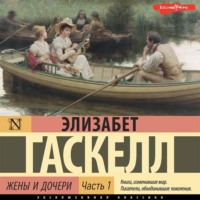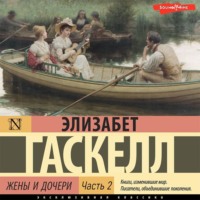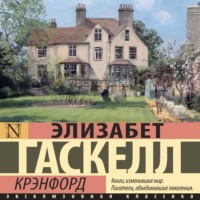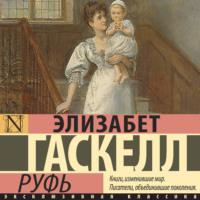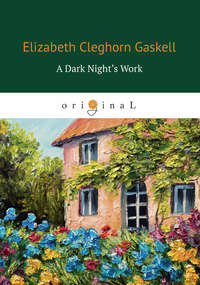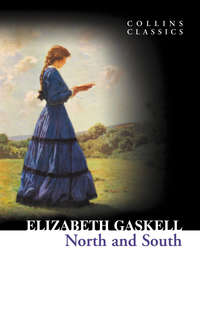
Полная версия
Mary Barton
‘Father, do you know George Wilson’s dead?’ (Her hand was suddenly and almost violently compressed.) ‘He dropped down dead in Oxford Road yester morning. It’s very sad, isn’t it, father?’
Her tears were ready to flow as she looked up in her father’s face for sympathy. Still the same fixed look of despair, not varied by grief for the dead.
‘Best for him to die,’ he said, in a low voice.
This was unbearable. Mary got up under pretence of going to tell Margaret that she need not come to sleep with her to-night, but really to ask Job Legh to come and cheer her father.
She stopped outside the door. Margaret was practising her singing, and through the still night air her voice rang out, like that of an angel:
‘Comfort ye, comfort ye, my people, saith your God.’
The old Hebrew prophetic words fell like dew on Mary’s heart. She could not interrupt. She stood listening and ‘comforted’, till the little buzz of conversation again began, and then entered and told her errand.
Both grandfather and grand-daughter rose instantly to fulfil her request.
‘He’s just tired out, Mary,’ said old Job. ‘He’ll be a different man to-morrow.’
There is no describing the looks and tones that have power over an aching, heavy-laden heart; but in an hour or so John Barton was talking away as freely as ever, though all his talk ran, as was natural, on the disappointment of his fond hope, of the forlorn hope of many.
‘Ay, London’s a fine place,’ said he, ‘and finer folk live in it than I ever thought on, or ever heerd tell on except in th’ story-books. They are having their good things now, that afterwards they may be tormented.’
Still at the old parable of Dives and Lazarus! Does it haunt the minds of the rich as it does those of the poor?
‘Do tell us all about London, dear father,’ asked Mary, who was sitting at her old post by her father’s knee.
‘How can I tell yo a’ about it, when I never see’d one-tenth of it. It’s as big as six Manchesters, they telled me. One-sixth may be made up o’ grand palaces, and three-sixths o’ middling kind, and th’ rest o’ holes o’ iniquity and filth, such as Manchester knows nought on, I’m glad to say.’
‘Well, father, but did you see the Queen?’
‘I believe I didn’t, though one day I thought I’d seen her many a time. You see,’ said he, turning to Job Legh, ‘there were a day appointed for us to go to Parliament House. We were most on us biding at a public-house in Holborn, where they did very well for us. Th’ morning of taking our petition we had such a spread for breakfast as th’ Queen hersel might ha’ sitten down to. I suppose they thought we wanted putting in heart. There were mutton kidneys, and sausages, and broiled ham, and fried beef and onions; more like a dinner nor a breakfast. Many on our chaps though, I could see, could eat but little. Th’ food stuck in their throats when they thought o’ them at home, wives and little ones, as had, maybe at that very time, nought to eat. Well, after breakfast, we were all set to walk in procession, and a time it took to put us in order, two and two, and the petition, as was yards long, carried by th’ foremost pairs. The men looked grave enough, yo may be sure; and such a set of thin, wan, wretched-looking chaps as they were!’
‘Yourself is none to boast on.’
‘Ay, but I were fat and rosy to many a one. Well, we walked on and on through many a street, much the same as Deansgate. We had to walk slowly, slowly, for th’ carriages an’ cabs as thronged th’ streets. I thought by-and-by we should maybe get clear on ’em, but as the streets grew wider they grew worse, and at last we were fairly blocked up at Oxford Street. We getten across at after a while though, and my eyes! the grand streets we were in then! They’re sadly puzzled how to build houses though in London; there’d be an opening for a good steady master builder there, as know’d his business. For yo see the houses are many on ’em built without any proper shape for a body to live in; some on ’em they’ve after thought would fall down, so they’ve stuck great ugly pillars out before ’em. And some on ’em (we thought they must be th’ tailors’ sign) had getten stone men and women as wanted clothes stuck on ’em. I were like a child, I forgot a’ my errand in looking about me. By this it were dinner-time, or better, as we could tell by the sun, right above our heads, and we were dusty and tired, going a step now and a step then. Well, at last we getten into a street grander nor all, leading to th’ Queen’s palace, and there it were I thought I saw th’ Queen. Yo’ve seen th’ hearses wi’ white plumes, Job?’
Job assented.
‘Well, them undertaker folk are driving a pretty trade in London. Well nigh every lady we saw in a carriage had hired one o’ them plumes for the day, and had it niddle noddling on her head. It were th’ Queen’s drawing-room, they said, and th’ carriages went bowling along toward her house, some wi’ dressed-up gentlemen like circus folk in ’em, and rucks* o’ ladies in others. Carriages themselves were great shakes too. Some o’ th’ gentlemen as couldn’t get inside hung on behind, wi’ nosegays to smell at, and sticks to keep off folk as might splash their silk stockings. I wonder why they didn’t hire a cab rather than hang on like a whip-behind boy; but I suppose they wished to keep wi’ their wives, Darby and Joan like. Coachmen were little squat men, wi’ wigs like th’ oud-fashioned parsons’. Well, we could na get on for these carriages, though we waited and waited. Th’ horses were too fat to move quick; they never known want o’ food, one might tell by their sleek coats; and police pushed us back when we tried to cross. One or two of ’em struck wi’ their sticks, and coachmen laughed, and some officers as stood nigh put their spy-glasses in their eye, and left ’em sticking there like mountebanks. One o’ th’ police struck me. “Whatten business have you to do that?” said I.
‘“You’re frightening them horses,” says he, in his mincing way (for Londoners are mostly all tongue-tied, and can’t say their a’s and i’s properly), “and it’s our business to keep you from molesting the ladies and gentlemen going to her Majesty’s drawing-room.”
‘“And why are we to be molested?”’ asked I, ‘“going decently about our business, which is life and death to us, and many a little one clemming at home in Lancashire? Which business is of most consequence i’ the sight o’ God, think yo, our’n or them grand ladies and gentlemen as yo think so much on?”
‘But I might as well ha’ held my peace, for he only laughed.’
John ceased. After waiting a little, to see if he would go on himself, Job said:
‘Well, but that’s not a’ your story, man. Tell us what happened when you got to th’ Parliament House.’
After a little pause, John answered:
‘If you please, neighbour, I’d rather say nought about that. It’s not to be forgotten, or forgiven either, by me or many another; but I canna tell of our down-casting just as a piece of London news. As long as I live, our rejection of that day will abide in my heart; and as long as I live I shall curse them as so cruelly refused to hear us; but I’ll not speak of it no* more.’
So, daunted in their inquiries, they sat silent for a few minutes.
Old Job, however, felt that some one must speak, else all the good they had done in dispelling John Barton’s gloom was lost. So after a while he thought of a subject, neither sufficiently dissonant from the last to jar on the full heart, nor too much the same to cherish the continuance of the gloomy train of thought.
‘Did you ever hear tell,’ said he to Mary, ‘that I were in London once?’
‘No!’ said she with surprise, and looking at Job with increased respect.
‘Ay, but I were though, and Peg there too, though she minds nought about it, poor wench! You must know I had but one child, and she were Margaret’s mother. I loved her above a bit, and one day when she came (standing behind me for that I should not see her blushes, and stroking my cheeks in her own coaxing way), and told me she and Frank Jennings (as was a joiner lodging near us) should be so happy if they were married, I could not find in my heart t’ say her nay, though I went sick at the thought of losing her away from my home. However, she was my only child, and I never said nought of what I felt, for fear o’ grieving her young heart. But I tried to think o’ the time when I’d been young mysel, and had loved her blessed mother, and how we’d left father and mother, and gone out into th’ world together, and I’m now right thankful I held my peace, and didna fret her wi’ telling her how sore I was at parting wi’ her that were the light o’ my eyes.’
‘But,’ said Mary, ‘you said the young man were a neighbour.’
‘Ay, so he were, and his father afore him. But work were rather slack in Manchester, and Frank’s uncle sent him word o’ London work and London wages, so he were to go there, and it were there Margaret was to follow him. Well, my heart aches yet at thought of those days. She so happy, and he so happy; only the poor father as fretted sadly behind their backs. They were married and stayed some days wi’ me afore setting off; and I’ve often thought sin’, Margaret’s heart failed her many a time those few days, and she would fain ha’ spoken; but I knew fra’ mysel it were better to keep it pent up, and I never let on what I were feeling; I knew what she meant when she came kissing, and holding my hand, and all her old childish ways o’ loving me. Well, they went at last. You know them two letters, Margaret?’
‘Yes, sure,’ replied his grand-daughter.
‘Well, them two were the only letters I ever had fra’ her, poor lass. She said in them she were very happy, and I believe she were. And Frank’s family heard he were in good work. In one o’ her letters, poor thing, she ends wi’ saying, “Farewell, Grandad!” wi’ a line drawn under grandad, and fra’ that an’ other hints I knew she were in th’ family way; and I said nought, but I screwed up a little money, thinking come Whitsuntide I’d take a holiday and go and see her an’ th’ little one. But one day towards Whitsuntide, comed Jennings wi’ a grave face, and says he, “I hear our Frank and your Margaret’s both getten the fever.” You might ha’ knocked me down wi’ a straw, for it seemed as if God told me what th’ upshot would be. Old Jennings had gotten a letter, you see, fra’ the landlady they lodged wi; a well-penned letter, asking if they’d no friends to come and nurse them. She’d caught it first, and Frank, who was as tender o’er her as her own mother could ha’ been, had nursed her till he’d caught it himself; and she expecting her down-lying* every day. Well, t’ make a long story short, old Jennings and I went up by that night’s coach. So you see, Mary, that was the way I got to London.’
‘But how was your daughter when you got there?’ asked Mary anxiously.
‘She were at rest, poor wench, and so were Frank. I guessed as much when I see’d th’ landlady’s face, all swelled wi’ crying, when she opened th’ door to us. We said, “Where are they?” and I knew they were dead, fra’ her look; but Jennings didn’t, as I take it; for when she showed us into a room wi’ a white sheet on th’ bed, and underneath it, plain to be seen, two still figures, he screeched out as if he’d been a woman.
Конец ознакомительного фрагмента.
Текст предоставлен ООО «ЛитРес».
Прочитайте эту книгу целиком, купив полную легальную версию на ЛитРес.
Безопасно оплатить книгу можно банковской картой Visa, MasterCard, Maestro, со счета мобильного телефона, с платежного терминала, в салоне МТС или Связной, через PayPal, WebMoney, Яндекс.Деньги, QIWI Кошелек, бонусными картами или другим удобным Вам способом.



